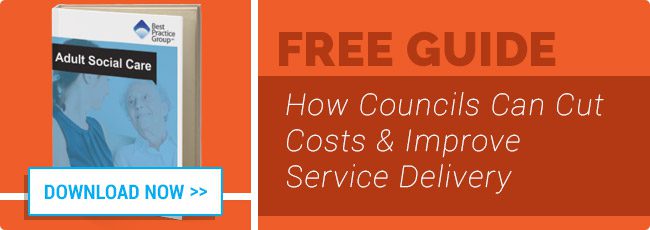
A mutual decision has been taken between The Cambridgeshire and Peterborough Clinical Commissioning Group (CPCCG) and UnitingCare to end their five-year, £800m health services contract, after just eight months. It’s the latest in a long line of major outsourcing relationships that have failed to reach their full term. Therefore, in this review article, we look to not only unravel what happened to bring all parties to this point, but also to investigate the three most important lessons we can all learn to minimise the risk of our strategic partnerships travelling a similar path.
Following a £1m procurement exercise, the NHS-led consortium, UnitingCare Partnership, was selected from a shortlist of three organisations by the CPCCG – its role, to supply healthcare services mainly to the region’s older adult population, for a five-year period, beginning 1st April 2015.
These services were to include urgent care, mental health services and support care for adults aged 65 and over, including inpatient and A&E services. They were also to provide adult community services for those over 18. In principle, the correct execution of these services would have led to lower costs and better health outcomes for the communities as a whole.
The mutual decision to end this outsourcing agreement follows an announcement that the contract had been found to not be “financially sustainable”.
These circumstances are certainly unfortunate. To those who oppose the outsourcing of NHS services, this project must now feel entirely “unnecessary and highly wasteful”, with some taking it as evidence to strengthen the case against all forms of public services outsourcing.
While it is sad news that this partnership has had to end so abruptly, it’s worth considering the environment in which it was conceived.
Extreme austerity measures force Clinical Commissioning Groups (CCGs), NHS Trusts and local authorities to completely rethink how their services are delivered. Unfortunately for those managing the delivery of these healthcare services, decisions have to be made that cannot please everyone as a balance must be struck between which services are to be maintained for an acceptable provision of quality healthcare for all.
CCG managers, in a bid to maintain these services, will now look to see whether there is an opportunity to deliver them in a ‘different’ way so as to maximise the available resources. A classic example of being forced to do more with less.
When new delivery methods are identified, these managers are responsible for determining whether the services they are responsible for would be better delivered in-house, or through partly or wholly outsourced agreements. At the same time, they must also consider the impact of any changes in service delivery while making allowances to prevent any adverse changes to social values and the local economy.
With these considerations in mind, you can see that this is a tough situation to be in. The path to a solution that pleases everyone (or enough people) in these cases is often unclear and fraught with risk in that there are many unknowns when trialling new or innovative methods of service delivery.
We must, therefore, compliment The Cambridgeshire and Peterborough Clinical Commissioning Group’s attempt to try something different in a bid to save vital health care services for their community.
It’s also worth considering that these procurement processes do not operate in a bubble.
The Cambridgeshire and Peterborough Clinical Commissioning Group will have received proposals, cases and promises from external providers. And, in the light of the fact that the project went ahead as it did, it would appear that these suppliers also believed that they were capable of delivering the required services within the budgets and constraints available to the group. So with the financial pressures and an urgent need to plan for and deliver vital services, you can begin to understand why a public health organisation under strain might go to great lengths to vet and choose an appropriate healthcare supplier based in part, on these promises.
Their £1m procurement exercise will likely have gone to great lengths to assess the expertise and ability of their short-listed providers to provide the necessary services at a rate that would fit within their budget. Those responsible for this exercise will have examined the intricacies and nuances within the proposed service delivery models with a view to choosing the appropriate balance between service quality, accessibility, jobs and overall effectiveness with the intention of getting the greatest services possible within their means while minimising the social impact.
It does beg the question as to whether enough due diligence was undertaken in regards to commercial sustainability. When spending £1m on the procurement process, how did the teams involved miss the fact that the supplier was unable to provide the required services for the prices stated?
Furthermore, now that £1m has already been spent, and more will likely be used to replace this partnership, does the previous business case still stack up in light of these figures?
Here are three lessons we would take away from our research into this case:
Lesson 1: Commercial Sustainability.
The crux of the decision to terminate this outsourcing agreement rested on commercial viability. Here, we can only speculate as to what might have happened. But commercial sustainability in outsourcing contracts is increasingly becoming a hot topic. Traditionally, procurement and buying teams have relied heavily on their supplier’s knowledge and expertise to provide solutions that were commercially sustainable. Unfortunately, external factors, changes in legislation and economic fluctuations can lead to increased costs, diminished margins and ultimately a contract that can end up operating at a loss.
Where public health and significant taxpayer funds are involved, it would always be prudent for more detailed due diligence exercises to take place. In the case of UnitingCare, this may well have happened and a financial ‘black swan event’ could have put all backup plans and contingency out to pasture. That said, we’re seeing an increasing need for in-house procurement and project teams to undertake more detailed commercial due-diligence themselves to assess the commercial sustainability of all the bids that they receive in order to avoid issues like those experienced by UnitingCare. For more on this, you can read our blog: Outsourcing Tenders, 6 Steps to Ensuring Commercial Sustainability.
For partnerships of this value, there ought to be a team with the overlapping project, technical and financial expertise in place to analyse bids with a view to identifying potential risks, gaps and issues that can be catered for or remedied pre-contractually to ensure a more commercially stable relationship.
Lesson 2: Recognising that an early exit was necessary
Exiting a partnership is a very tough decision, particularly in cases that involve public authorities. These public bodies are usually under much closer scrutiny and are obliged to be more transparent about their dealings, whereas private companies can restrict the flow of project-specific information. As such, when taxpayer’s money is at risk, public authorities arguably attract greater criticism when these contracts are terminated early, as they are perceived by the public and other groups to have ‘failed’; no one wants to put their hands up and admit to having failed at something.
When public health is at stake, pride should have no place in critical decision-making; so where a partnership is not delivering the desired benefits, and no practical alternative solution can be identified, it makes sense to dissolve the arrangement with a view to replacing the mechanism for service delivery as quickly and as effectively as possible.
What should be appreciated is the speed at which both parties were able to identify that the partnership was not fit for purpose, as it is not uncommon for similar partnerships to last for years where the ‘parents’ stay together for the ‘sake of the children’. By terminating the outsourcing agreement early, both parties will have saved money and stand to reap greater benefits by parting company; assuming that an appropriate plan for transition and exit is in place.
The impact of admitting to having been a part of a ‘failed’ outsourcing relationship cannot be underestimated, though they do need to be kept in perspective. The political, executive and reputational risks can be significant and have the potential to negatively impact one’s career. That said, we’re of the opinion that executives who are prepared to recognise that they have a problem, while evidencing the possible solutions and then acting on them, are worth their weight in gold.
This appears to be what’s happened in this case. So while it’s regrettable that significant public funds were spent in setting up this partnership for it to end so quickly, it’s ultimately better for the residents of Cambridgeshire and Peterborough that this happens now, as opposed to years down the line when costs have escalated, service quality has declined, and other healthcare services have suffered as a result of this partnership’s drain on the Clinical Commissioning Group’s much-needed resources.
Lesson 3: What would ‘good look like’ for a relationship like this?
Adult social care, by its very nature, is a vital service dealing with vulnerable people and it carries dire consequences if things were to go wrong. It’s important then, that for those looking to outsource or rethink the delivery of such services, that they have a clear understanding of precisely what their desired outcomes are. Where partnerships are established without clear outcomes, it can be very difficult for the supplier to develop or maintain a solution that meets these needs.
With so few successful models to imitate, this can be particularly difficult. That said, the partnership pursued by Staffordshire County Council and Stoke-on-Trent NHS Trust is presently delivering some strong outcomes and we were fortunate enough to be involved in setting this up in the early stages.
Conclusion
While it is certainly a shame that this attempt at an innovation-led partnership was unable to go the distance, we applaud the team’s consideration of new models, and their timely recognition of issues preventing wider commercial damage which may well have led to a decline in service quality for the residents of Cambridgeshire. None of the decisions involved in this early outsourcing termination will have been easy, but they will ultimately lead to the best outcomes for local residents and healthcare budgets.
Where budgetary pressures mean that service providers can no longer ravage overheads in a bid to lower costs, taking the bold step to examine and commission a partnership will have been a difficult, and risky, decision. Suppliers are aware of the impact ‘austerity’ has had, so they’ve gone to great lengths to find new ways to help save clients’ money. Using a partnership-led model to access these new methods to secure cost savings, on the face of it, seemed a sensible step.
True innovation in partnerships in our experience is closely tied to contractual structure. A well-thought-out contract that rewards performance improvements and savings in costs (the intended benefits of innovation) will help to guide the relationship so that these innovations have space to flourish. In respect of the UnitingCare contract, only those who were closely linked to the project will be aware of the depth and complexity of such contractual devices, and whether or not they were present in the contract at all.
The important point here is that the intentions were good and that the failure of the agreement on the grounds of commercial sustainability does not necessarily mean that the rest of the agreement was improperly structured. It does, however, highlight gaps in the £1m procurement process which many in the procurement and outsourcing industry could learn from.
We would advise anyone looking to embark on the formation of a strategic partnership to add commercial sustainability to their assessment weighting when considering supplier bids, and we would advocate that an experienced, multidisciplined team presides over the submissions to unearth gaps in their financial viability.
For more information and guidance on key considerations when rethinking the delivery of adult social care services, you can download our Adult Social Care white paper for free.

